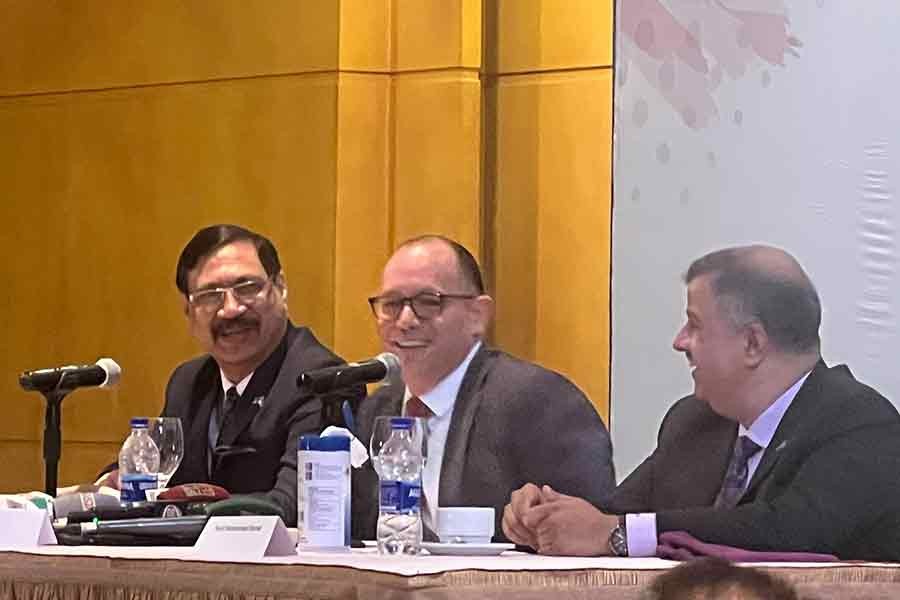
Published :
Updated :

Bangladesh is yet to fulfil the labour reforms required for the Generalised System of Preferences (GSP), says US Ambassador in Bangladesh Peter Haas.
Addressing a meeting of the American Chamber of Commerce in Bangladesh (AmCham) held in Dhaka, the US ambassador also reminded that the same kind of reform is also crucial to get the EU’s GSP plus facility, which is more important for the country.
Peter Haas explained that the improvement of the US-Bangladesh ties does not mean the growth of trade as his country considers the factors like democracy and human rights as instrumental and critically important for sound bilateral ties.
Highlighting the US expectations from Bangladesh, he listed a string of measures including ensuring free and fair elections, joining the Indo-Pacific alliance, and signing two military agreements.
“As the relationship between the United States and Bangladesh is so rich and so varied and so interconnected that you can't just focus trade, investment and hope to advance the relationship,” he said while outlining the measures.
“We really have to look at the relationship as comprehensively and how to deepen each and every aspect of that relationship.”
He said the United States have five goals for Bangladesh and these goals are mutually reinforcing, integrated and holistic.
Responding to a question on the restoration of the GSP he said, the US suspended GSP because of its concern over the labour rights protections in Bangladesh, and those concerns still persist.
“Though there is ‘tremendous progress, particularly in worker safety and particularly in export-oriented sectors, there has been less progress perhaps in non-export sectors,” he said.
The US envoy also pointed out the achievement of less progress in enabling labours to form unions for their collective bargaining.
He observed that the GSP Plus facility of the EU also requires much greater labour protections for GSP.
The envoy mentioned that funding from the Development Finance Corporation, the development finance institution and agency of the United States federal government, also requires improvement of the labour rights situation.
Referring to the US country strategy on Bangladesh, the envoy said, “US wants to see ‘a more peaceful and stable Bangladesh, better able to provide for its own security, counter threats to US interests, and serve as a growing security contributor in the Indo-Pacific and globally.”
“So we're committed to working together to ensure that the Indo-Pacific region remains free, open, peaceful, prosperous and secure.”
Highlighting the importance of stronger military ties, he said, “Peace and security are the fundamental aspects to prosperity and military of both the countries regularly works to increase the ability to respond to humanitarian disasters and to reinforce the partnerships between them.”
In this regard, he mentioned the 46th annual Indo-Pacific army management seminar jointly organised by the two countries last month in Dhaka.
“So, this gathering is one of the largest land forces conferences in the entire region. Senior military officials from all of the Indo-Pacific countries were invited to exchange their views and ideas,” he said adding that it demonstrated joint commitment to a free and open Indo-Pacific.
The US also wants to sign two foundational agreements with Bangladesh to advance military relations namely the General Security of Military Information Agreement (GSOMIA) and the Acquisition Cross-Servicing Agreement (ACSA).
Ruling out any scope of complicacy on the deals, the US envoy said the ACSA just allows the militaries of both countries to provide each other logistical support, and supply services to each other.
“If an American ship in the Bay of Bengal needs a spare part, the agreement allows the Bangladesh Navy to provide that spare part,” he said detailing the ACSA.
He said, “Similarly GSOMIA is not very frightening as the agreement will allow our militaries to exchange confidential information.”
Talking about US’s vision on democracy and governance in Bangladesh, the ambassador said, “Our second goal on the nest is committed to democracy, transparency, pluralism, tolerance, good governance and respect for human rights and simply plays democracies tend to do a much better job of generating and sustaining prosperity than other governance regimes”.
“The promotion of democracy is particularly important right now is founded so looks towards the upcoming parliamentary elections,” the US envoy said.
“I want to make one thing very clear here. The United States does not support any particular political party. I'll repeat it. The United States does not support any particular political party.”
“What we do want is a free and fair election, conducted in accordance with international standards, where the people of Bangladesh can freely choose their own government,” he added.
He noted that ensuring free and fair elections is everybody's responsibility from the election commission to the government, from media to law enforcement agencies, and from civil society to political parties.
AmCham President Syed Ershad Ahmed moderated the discussion titled ‘US Bangladesh bilateral relations: Business and trade as keys to expansion’. Its vice president Syed Mohammad Kamal gave the vote of thanks.
mirmostafiz@yahoo.com


 For all latest news, follow The Financial Express Google News channel.
For all latest news, follow The Financial Express Google News channel.